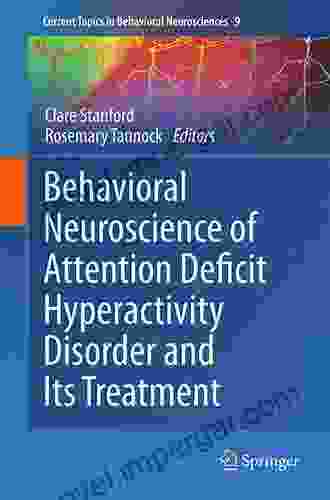Behavioral Neuroscience of Attention Deficit Hyperactivity Disorder: A Comprehensive Guide

: Understanding the Neurobiology of ADHD

5 out of 5
| Language | : | English |
| File size | : | 2200 KB |
| Text-to-Speech | : | Enabled |
| Screen Reader | : | Supported |
| Enhanced typesetting | : | Enabled |
| Print length | : | 877 pages |
Attention Deficit Hyperactivity DisFree Download (ADHD) is a neurodevelopmental condition that affects millions of individuals worldwide. Characterized by difficulties with attention, hyperactivity, and impulsivity, ADHD can significantly impact a person's daily life, academic performance, and social interactions. To effectively support individuals with ADHD, it's crucial to understand the underlying neurobiology of this condition. This comprehensive guide will delve into the latest research and practical insights, empowering you with a deeper understanding of the behavioral neuroscience of ADHD.
The Neurobiology of Attention: Exploring the Brain's Executive Control Center
Attention is a complex cognitive function that involves the ability to focus, sustain attention, and shift between different tasks. In individuals with ADHD, research indicates differences in the functioning of specific brain regions and neurotransmitters involved in attentional processes. The prefrontal cortex, a brain region responsible for executive functions, plays a crucial role in attention control. Studies have shown reduced activity and connectivity within the prefrontal cortex in individuals with ADHD, which may contribute to difficulties with attentional processes.
Neurotransmitter Imbalances: Uncovering the Role of Dopamine and Norepinephrine
Neurotransmitters are chemical messengers that facilitate communication between neurons in the brain. Dopamine and norepinephrine are two key neurotransmitters involved in attention, motivation, and reward processing. In individuals with ADHD, research suggests imbalances in these neurotransmitter systems. Dopamine, which plays a role in attention and reward, has been found to be lower in individuals with ADHD. Similarly, norepinephrine, which is involved in arousal and attention, may also be affected. Understanding these neurotransmitter imbalances can help guide targeted treatment approaches.
Executive Function Deficits: Exploring the Impact on Cognitive Control
Executive functions are a set of higher-Free Download cognitive skills that include working memory, inhibitory control, and planning. These skills are essential for regulating behavior, managing emotions, and goal-directed activities. In individuals with ADHD, deficits in executive function areas have been well-documented. For instance, difficulties with working memory can impact attention and learning, while impaired inhibitory control can lead to impulsive behavior. Understanding these deficits can help develop tailored interventions to strengthen executive function abilities.
Cognitive Remediation: Empowering Individuals with ADHD
Cognitive remediation is a type of intervention that aims to improve cognitive skills and functioning in individuals with ADHD. Based on the principles of neuroplasticity, which is the brain's ability to change and adapt, cognitive remediation exercises target specific cognitive areas, such as attention, working memory, and executive function. Research has shown that cognitive remediation can lead to improvements in attention, behavior, and academic performance in individuals with ADHD. By engaging in regular cognitive exercises, individuals can strengthen their cognitive abilities and enhance their overall functioning.
Medication Management: Exploring Pharmacological Interventions
Medication management is a common treatment approach for ADHD. Stimulant medications, such as methylphenidate and amphetamine, are often used to improve attention and control hyperactive and impulsive behaviors. These medications work by increasing the levels of dopamine and norepinephrine in the brain, which can help regulate attention and behavior. However, medication management should be carefully monitored and tailored to the individual's needs and response to treatment.
Lifestyle Modifications: Promoting Well-being and Success
In addition to pharmacological interventions and cognitive remediation, lifestyle modifications can play a significant role in supporting individuals with ADHD. Regular exercise, a healthy diet, and adequate sleep have all been shown to improve attention and behavior. Exercise can help reduce hyperactivity and impulsivity by providing an outlet for excess energy. A balanced diet that includes plenty of fruits, vegetables, and whole grains can provide the necessary nutrients to support brain function. Additionally, establishing regular sleep patterns and getting enough sleep can help regulate brain activity and improve attention during the day.
: Empowering Individuals and Transforming Lives
Understanding the behavioral neuroscience of Attention Deficit Hyperactivity DisFree Download is essential for providing effective support and interventions for individuals with ADHD. By delving into the neurobiology of attention, cognitive processes, and neurotransmitter imbalances, we can gain a deeper understanding of the challenges faced by individuals with ADHD. Through targeted cognitive remediation, medication management, and lifestyle modifications, we can empower individuals with ADHD to reach their full potential, succeed in their academic and personal endeavors, and live fulfilling lives.
5 out of 5
| Language | : | English |
| File size | : | 2200 KB |
| Text-to-Speech | : | Enabled |
| Screen Reader | : | Supported |
| Enhanced typesetting | : | Enabled |
| Print length | : | 877 pages |
Do you want to contribute by writing guest posts on this blog?
Please contact us and send us a resume of previous articles that you have written.
 Book
Book Novel
Novel Page
Page Chapter
Chapter Text
Text Story
Story Genre
Genre Reader
Reader Library
Library Paperback
Paperback E-book
E-book Magazine
Magazine Newspaper
Newspaper Paragraph
Paragraph Sentence
Sentence Bookmark
Bookmark Shelf
Shelf Glossary
Glossary Bibliography
Bibliography Foreword
Foreword Preface
Preface Synopsis
Synopsis Annotation
Annotation Footnote
Footnote Manuscript
Manuscript Scroll
Scroll Codex
Codex Tome
Tome Bestseller
Bestseller Classics
Classics Library card
Library card Narrative
Narrative Biography
Biography Autobiography
Autobiography Memoir
Memoir Reference
Reference Encyclopedia
Encyclopedia Steve Cohen
Steve Cohen Ronald D Miller
Ronald D Miller Sharon Bennett Connolly
Sharon Bennett Connolly Vox Day
Vox Day S Leyla Gurkan
S Leyla Gurkan Xiaojian Zhao
Xiaojian Zhao Richard Goldberg
Richard Goldberg Ward Preston
Ward Preston Steve H Nickles
Steve H Nickles Sasha Fenton
Sasha Fenton Sean Cook
Sean Cook Stefanie Green
Stefanie Green Robert Macklin
Robert Macklin Serena Mayeri
Serena Mayeri Veronique Henderson
Veronique Henderson Richard Townshend Bickers
Richard Townshend Bickers Sue Bender
Sue Bender Rinette Lagace
Rinette Lagace Robert F Kahrs
Robert F Kahrs Axel Madsen
Axel Madsen
Light bulbAdvertise smarter! Our strategic ad space ensures maximum exposure. Reserve your spot today!

 Brayden ReedImmigrants in the Lands of Promise: A Story of Courage, Resilience, and the...
Brayden ReedImmigrants in the Lands of Promise: A Story of Courage, Resilience, and the... Donald WardFollow ·4.7k
Donald WardFollow ·4.7k Robert Louis StevensonFollow ·17.7k
Robert Louis StevensonFollow ·17.7k Frank MitchellFollow ·3.7k
Frank MitchellFollow ·3.7k Carter HayesFollow ·17.8k
Carter HayesFollow ·17.8k John Dos PassosFollow ·18.5k
John Dos PassosFollow ·18.5k Andrew BellFollow ·9.8k
Andrew BellFollow ·9.8k Wayne CarterFollow ·17.1k
Wayne CarterFollow ·17.1k Marcus BellFollow ·16.1k
Marcus BellFollow ·16.1k

 Colt Simmons
Colt SimmonsLarge Collieries Iron Mines Stone Iron And Tinplate...
Step back in time and witness...

 Zachary Cox
Zachary CoxUnlocking the Secrets of Woody Plants: An In-Depth...
: Embark on a captivating journey into the...

 Yasunari Kawabata
Yasunari KawabataIntroducing 'Librarian Guide: 3rd Edition' – The Ultimate...
In the dynamic and ever-evolving...

 Jerome Blair
Jerome BlairEvading Honesty: A Masterful Exploration of Deceit and...
Prepare to be captivated...

 Timothy Ward
Timothy WardLove Is Real: A Novel of Love, Loss, and the Enduring...
Prepare to embark on a...
5 out of 5
| Language | : | English |
| File size | : | 2200 KB |
| Text-to-Speech | : | Enabled |
| Screen Reader | : | Supported |
| Enhanced typesetting | : | Enabled |
| Print length | : | 877 pages |












